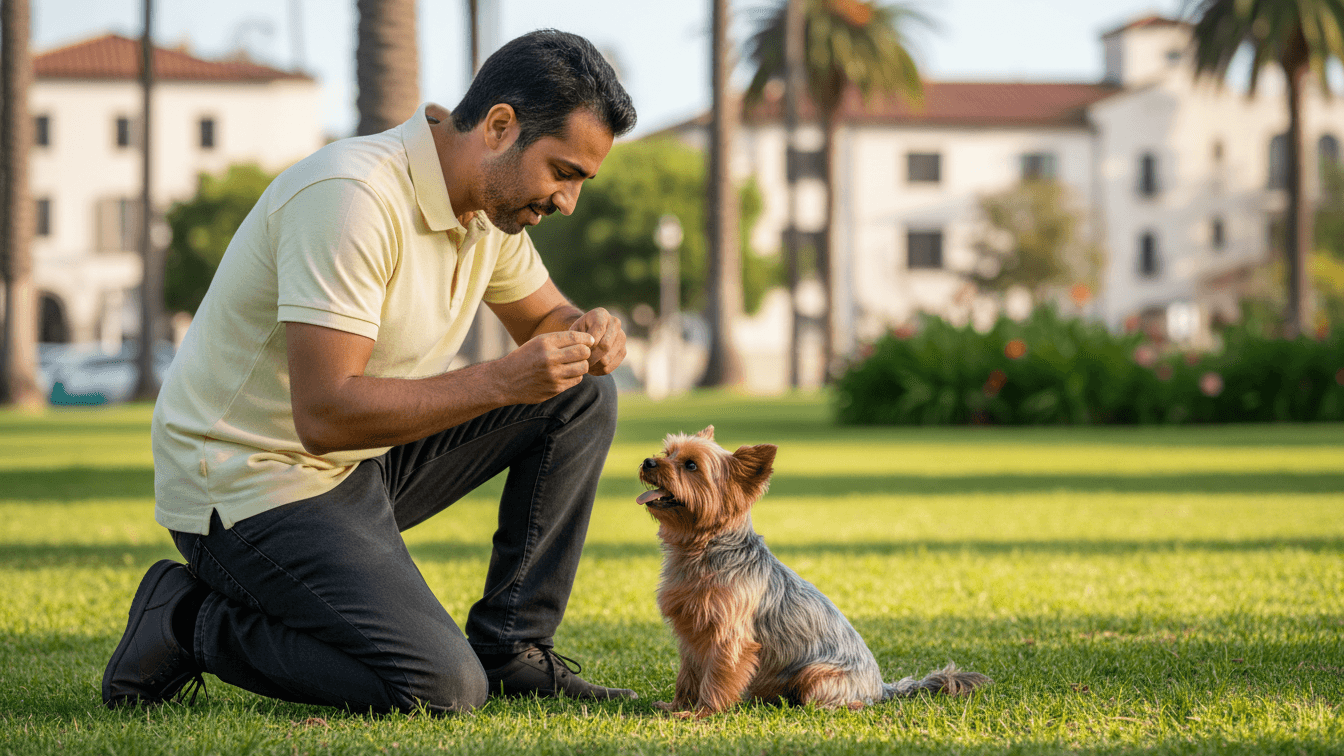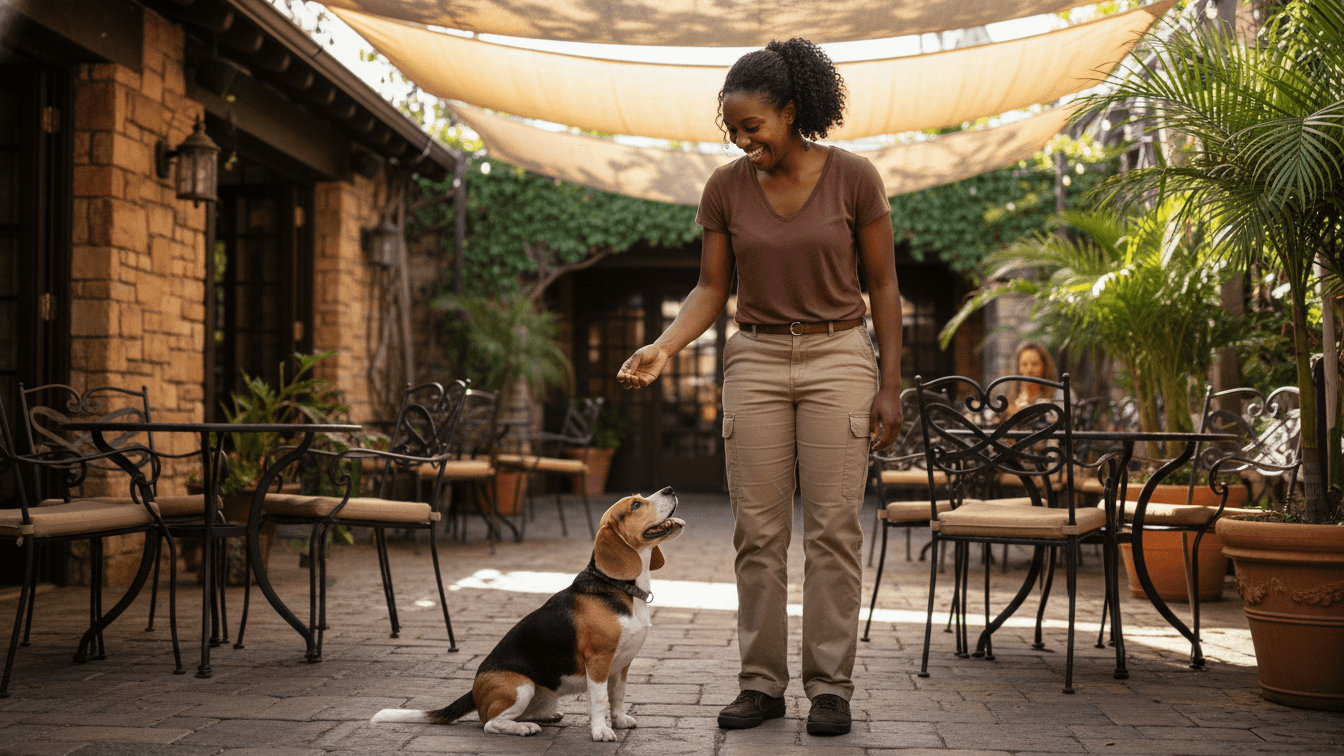Your Complete Guide to Choosing a Dog Trainer in California
California dog owners face unique challenges, from navigating crowded urban parks in Los Angeles and San Francisco to managing off-leash training in coastal areas and desert communities. Whether you’re in San Diego’s beachfront neighborhoods, Sacramento’s busy downtown, or smaller communities throughout the state, your dog needs solid training to handle California’s active outdoor lifestyle.
Finding the right professional dog trainer means looking for someone who understands California-specific regulations, from strict leash laws in most municipalities to breed-specific rules in certain counties. A trainer familiar with your area will help you raise a well-behaved dog who can enjoy everything California offers.
How to Choose the Right Trainer
Start by focusing on trainers who use positive reinforcement training methods and understand California’s diverse environments. Your dog should learn to stay calm near busy farmers markets, walk politely through crowded downtown areas, and remain focused during visits to dog-friendly patios and shops.
Look for credentials that demonstrate serious training education. Common dog trainer certifications include KPA-CTP, CPDT-KA, or IAABC-CDBC for behavior issues. If your dog shows aggression or serious fear, seek someone with CBCC-KA or a science-based program like CTC.
In-home dog training works best for household manners, door greetings, and basic obedience around your neighborhood. Group classes make sense once your dog can focus around distractions, especially before tackling busy California locations like outdoor shopping centers or waterfront walkways.
Ask potential trainers about their experience with California’s specific challenges, including wildlife encounters, extreme heat management in inland areas, and crowded public spaces along the coast.
Common Dog Training Methods Explained

Reward-based methods create lasting behavior changes while helping you meet California’s strict animal control requirements. These humane techniques build trust and keep your dog motivated to learn.
Basic obedience covers sit, down, stay, place, recall, and leash training so your dog can handle sidewalk cafes, hiking trails, and neighborhood walks without pulling or jumping on strangers.
Puppy training focuses on socialization, potty training, bite inhibition, crate comfort, and early leash skills. Starting young prevents problem behaviors from developing and helps your puppy adjust to California’s busy, stimulating environment.
Behavior modification addresses fear, reactivity, resource guarding, or separation anxiety through gradual desensitization and counterconditioning. For serious cases, expert dog trainers often coordinate with veterinarians who understand behavior medication options.
Private lessons and in-home sessions let you customize training around your daily routines and specific home environment. Day training can speed up results when your schedule is packed.
Dog training classes help your dog practice good manners around other dogs and people. Quality group classes maintain adequate spacing, screen participants carefully, and teach calm behavior rather than over-excitement.
Specialized training for therapy dog work or service dog training requires extensive public-access skills, advanced obedience, and a structured, step-by-step program. California has specific public access laws that these dogs must meet.
Board and train programs immerse your dog in intensive training away from home. Make sure any facility you consider uses only humane methods and provides clear handoff sessions so you can maintain the skills your dog learns.
Stay away from any trainer who relies on fear, intimidation, or pain. These outdated methods create long-term behavioral problems and can lead to complaints from neighbors or even legal issues in communities with strict animal welfare ordinances.
Average Cost of Dog Training in California (Updated for 2025)
California training costs vary significantly by region, with higher prices in major metropolitan areas and more moderate rates in smaller communities. Trainer experience, session length, and travel distance all affect pricing.
| Service Type | Average Cost (California) |
|---|---|
| Puppy classes (4-6 weeks) | $175-$350 total |
| Group obedience classes (4-6 weeks) | $180-$375 total |
| Private lessons (60-90 min) | $125-$250 per session |
| In-home training packages (4-6 visits) | $500-$1,200 total |
| Day training (weekly rate) | $500-$1,100 per week |
| Behavior consult (initial session) | $175-$300 |
| Board and train (2-4 weeks) | $2,500-$6,000 total |
Expect higher rates in San Francisco, Los Angeles, San Diego, and Silicon Valley areas. Inland and rural communities typically fall toward the lower end of these ranges.
Many certified dog trainers offer a free consultation to assess your dog’s needs and explain their training program before you commit to a package.
Questions to Ask a Potential Dog Trainer
- What training methods do you use, and how do you keep training sessions positive and stress-free?
- What credentials do you hold, such as CPDT-KSA or KPA-CTP? How do you stay current with continuing education?
- How will you adapt your approach for my dog’s specific needs and our California lifestyle?
- Do you offer in-home visits, group classes, or day training, and which option fits my goals best?
- How will we track my dog’s progress and know when to add more challenging distractions?
- What are the total costs, including travel fees for distant locations, and what’s your cancellation policy?
- Do you carry liability insurance, and can you provide proof of coverage?
- For behavior problems, will you collaborate with my veterinarian if needed?
- What should I practice between sessions to help my dog continue improving?
- Have you worked with dogs facing California-specific challenges like wildlife distractions, extreme heat, or crowded urban environments?
Local California Rules and Considerations
California has some of the strictest animal control laws in the country. Most cities and counties enforce leash laws, licensing requirements, and nuisance regulations to protect public safety.
Leash laws apply in nearly all public spaces throughout California unless you’re inside a designated off-leash dog park. Most municipalities require a maximum 6-foot leash in parks, on sidewalks, and at public events.
California law requires current rabies vaccination for all dogs over four months old. Your county issues licenses annually, and you must display the license tag on your dog’s collar. Contact your local animal control department for specific licensing requirements.
Many California cities have strict barking ordinances that define excessive noise as a public nuisance. Work with your trainer on alert barking, separation anxiety, and other noise issues before neighbors file complaints.
Some California counties and cities maintain breed-specific regulations or additional restrictions on certain dog types. Check your local municipal code to understand any special requirements.
Dog trainers in California don’t need state-level licensing or certification to operate. However, if a trainer boards dogs for overnight stays during board and train programs, they may need kennel permits or business licenses from their city or county.
California's Department of Food and Agriculture oversees commercial animal facilities, but this primarily applies to large-scale kennels rather than individual trainers. Always verify that any boarding facility meets local health and safety standards.
Trainers conducting commercial training sessions in public parks may need permits or proof of liability insurance from the city or county parks department.
Local California Resources for Dog Owners
California offers thousands of dog-friendly locations where you can practice training, provide enrichment, and socialize your dog. These resources help you build real-world skills in the environments your dog will actually encounter.
- Runyon Canyon Park in Los Angeles offers off-leash areas where dogs can practice recalls and trail manners around other hikers and wildlife.
- Fort Funston in San Francisco provides expansive off-leash beach access and trails perfect for building confidence and practicing distance commands.
- Balboa Park in San Diego features the Nate’s Point Dog Park, a large fenced area ideal for safe off-leash training and socialization with clear posted rules.
- Fiesta Island in San Diego offers a massive off-leash zone where dogs can run freely while you work on distance recalls.
- Point Isabel Regional Shoreline in Richmond provides one of the largest off-leash areas in the Bay Area with waterfront access.
- Huntington Dog Beach in Huntington Beach allows off-leash play on the sand and in the surf year-round, making it perfect for water-loving dogs.
- Rosie’s Dog Beach in Long Beach is Southern California’s first off-leash dog beach and offers excellent opportunities for socialization and training around distractions.
Many California state parks allow leashed dogs on trails and in campgrounds. Check individual park regulations before visiting, as some sensitive habitat areas restrict dog access.

FAQs
How much does in-home dog training cost?
Most California trainers charge $125-$250 per in-home visit, with package discounts available when you book multiple sessions. Behavior modification for reactivity or aggression typically starts at the higher end of this range.
Is in-home dog training worth it?
Absolutely, because you’re addressing problems exactly where they happen. Your trainer can work on door manners, jumping on guests, counter-surfing, and yard reactivity in your actual home, then step outside to practice leash skills on your real neighborhood sidewalks and around your local distractions.
Can you pay someone to house train your dog?
Yes, many trainers offer puppy training programs that include potty training guidance, crate training, and daily schedule setup. Day training can accelerate the process while teaching you how to maintain consistency.
What is the 3-3-3 rule for dog training?
This guideline helps set realistic expectations for newly adopted dogs: expect about 3 days for your dog to decompress, 3 weeks to learn your household routines, and 3 months to feel completely settled. Effective training programs work with this natural adjustment timeline rather than against it.
How long will it take to reach my training goals?
Most puppies and friendly adult dogs show solid progress within 4-8 weeks when owners practice daily. Fear, reactivity, or aggressive dog training typically requires several months of careful behavior modification with gradual increases in difficulty and distraction levels.
What should I bring to group classes?
Pack a flat collar or harness, a 6-foot leash, high-value treats your dog loves, fresh water, and current vaccination records if your trainer requests them. Leave retractable leashes at home for everyone’s safety.
What’s the leash law in California?
California doesn’t have a single statewide leash law, but nearly every city and county requires dogs to be leashed in public spaces. Most jurisdictions mandate a maximum 6-foot leash in parks, on sidewalks, and at public events, with exceptions only for designated off-leash dog parks and beaches.
Do I need a dog license in California?
Yes, nearly all California counties require annual dog licenses. You’ll need proof of current rabies vaccination to obtain a license, and your dog must wear the license tag on their collar. Contact your county animal control office for specific requirements and fees.
What shots does my dog need in California?
California law requires rabies vaccination for all dogs over four months old. Your veterinarian will likely also recommend core vaccines like distemper-parvo combination and bordetella, especially if your dog will attend group classes or visit dog parks.
Are dog trainers required to be licensed in California?
No, California doesn’t require special licenses or certifications for dog trainers to operate. Trainers follow standard business regulations, but if they offer boarding services during board and train programs, they may need kennel permits from their local city or county.
Where can I practice off-leash recall?
Use designated off-leash dog parks and beaches throughout California to practice recall safely and legally. Visit during quieter hours when you’re first teaching this skill to minimize distractions.
Which dog parks allow training around California?
Most California dog parks welcome training activities as long as you follow posted rules and don’t disrupt other visitors. Popular training-friendly locations include Fiesta Island in San Diego, Point Isabel in Richmond, and the many fenced dog parks throughout Los Angeles County.
What beaches or trails allow dogs for training?
California offers dozens of dog-friendly beaches, including Huntington Dog Beach, Rosie’s Dog Beach, Carmel Beach, and Fort Funston. Most allow off-leash access in designated areas. Many state and regional parks permit leashed dogs on trails, though some sensitive habitat areas restrict access. Always check specific park regulations before visiting.
What should I do if my dog is reactive to other dogs?
Work with a trainer experienced in behavior modification who can create a gradual desensitization plan. Start training in low-distraction environments and slowly increase difficulty as your dog builds confidence. Avoid crowded dog parks until your dog has made significant progress.
How do I find a certified dog trainer near me?
Look for trainers holding credentials from respected organizations and check their websites for information about their methods and experience. A free evaluation session lets you meet the trainer and assess whether their approach fits your needs.
Can training help with separation anxiety?
Yes, behavior modification for separation anxiety typically involves gradual desensitization to your departures, building calm alone-time skills, and addressing any underlying stress. This process takes patience and consistency but creates lasting improvement when done correctly.
The right combination of skilled training, humane methods, and consistent practice in California’s diverse environments will help your dog become a confident, polite companion. Whether you choose dog training classes, private lessons, or in-home dog training services, focus on finding someone who uses positive reinforcement and understands the specific challenges California dog owners face every day.
